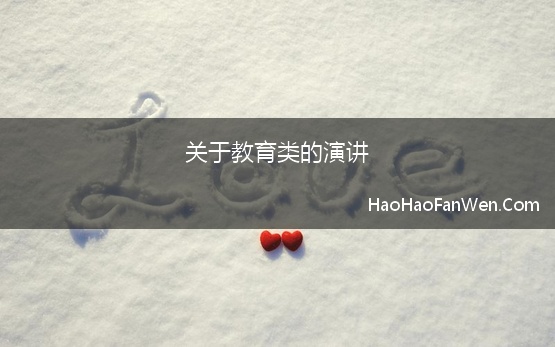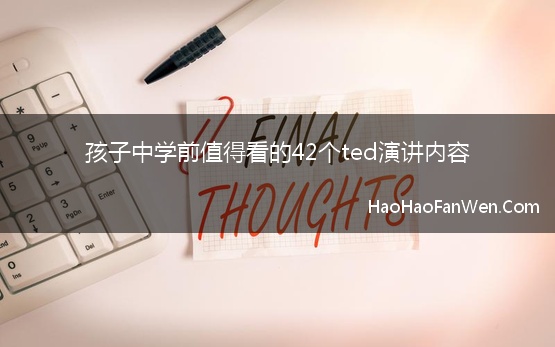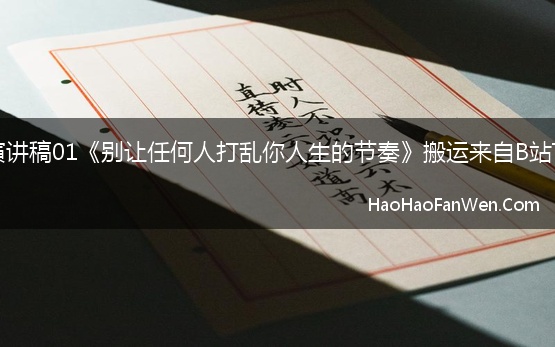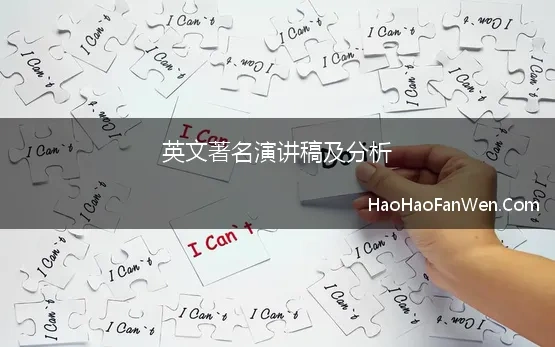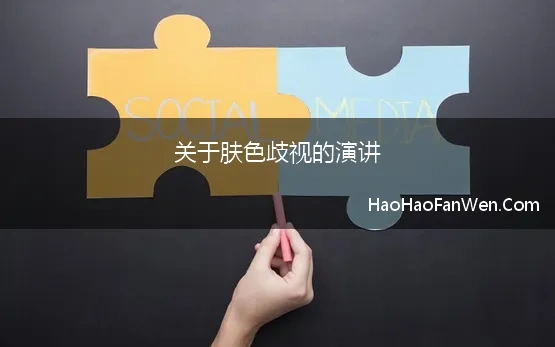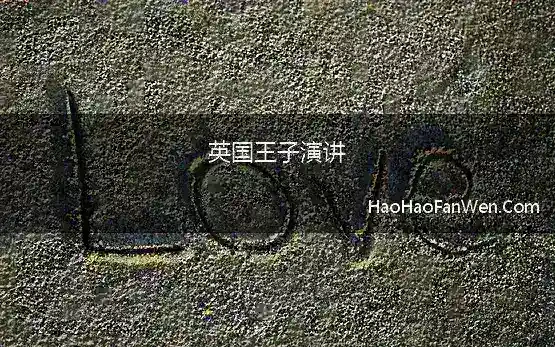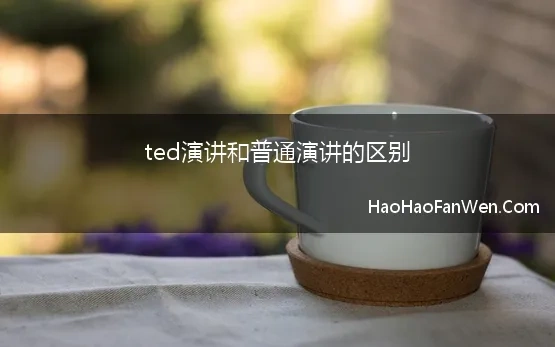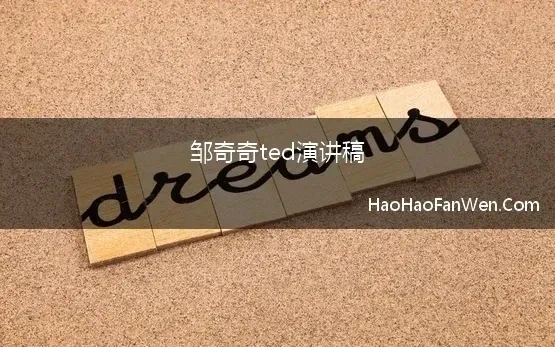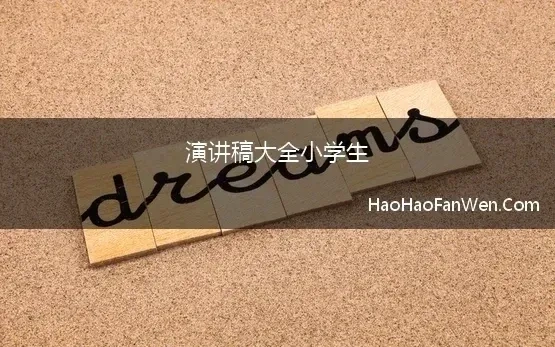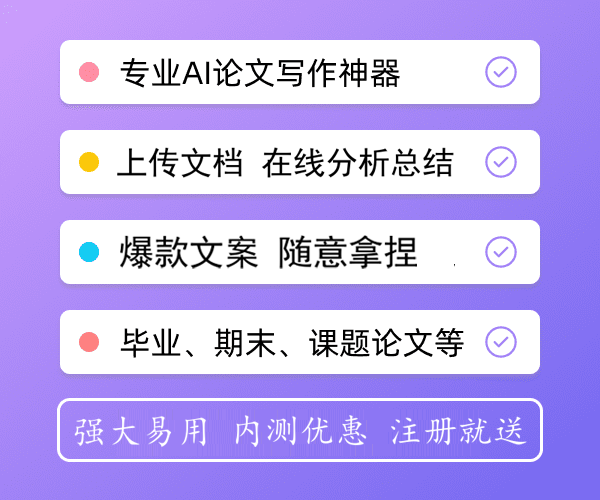TED演讲分享:The
下面是好好范文网小编收集整理的TED演讲分享:The,仅供参考,欢迎大家阅读!
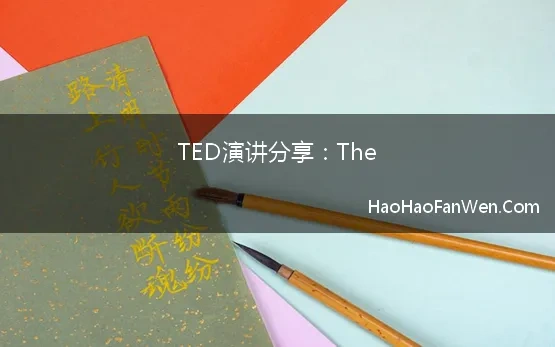
演讲者:Susan David
这是一篇16min左右的TED演讲,主讲人是情绪管理领域的研究者。演讲内容虽然专业性偏强,但不会过于教条,相反,它十分通俗易懂。演讲者从自己贫困的童年环境展开,讲述情绪管理的重要性,并给出了一些情绪管理的策略。
PS:很多同学有一个误区,那就是认为“看上去完全喜怒不形于色”是高情商的表现。其实不然,本则视频会告诉你,真正的高情商不是完全不表达情绪,也不是只表达那些“看起来正常的情绪”,而是能接纳负面情绪、能和它们好好相处。
Hello, everyone.
大家好
Sawubona.
In South Africa, where I come from, "sawubona" is the Zulu word for "hello." There's a beautiful and powerful intention behind the word because "sawubona" literally translated means, "I see you, and by seeing you, I bring you into being." So beautiful, imagine being greeted like that. But what does it take in the way we see ourselves? Our thoughts, our emotions and our stories that help us to thrive in an increasingly complex and fraught world?
在我来自的南非“ sawubona”是祖鲁语中“你好”,这个词背后有一个美丽而强大的意思,“ sawubona”的字面意思是“我看到你,通过看到你就带给你了成就” 想象一下受到这样的欢迎多么美妙。 但是我们如何看待自己呢? 我们的思想,我们的情感和我们的故事能否帮助我们在一个日益复杂和充满忧虑的世界中茁壮成长?
This crucial question has been at the center of my life's work. Because how we deal with our inner world drives everything. Every aspect of how we love, how we live, how we parent and how we lead. The conventional view of emotions as good or bad, positive or negative, is rigid. And rigidity in the face of complexity is toxic. We need greater levels of emotional agility for true resilience and thriving.
这个关键问题一直是我毕生工作的中心。 因为我们处理内心世界的方式决定了一切。 我们如何去爱,如何生活,如何抚养孩子,如何领导孩子。 传统的观点认为情绪是好的或坏的,积极的或消极的,是僵化的。 在复杂面前的僵化是有害的。 我们需要更高水平的情感灵活性,才能真正恢复和茁壮成长。
My journey with this calling began not in the hallowed halls of a university, but in the messy, tender business of life. I grew up in the white suburbs of apartheid South Africa, a country and community committed to not seeing. To denial. It's denial that makes 50 years of racist legislation possible while people convince themselves that they are doing nothing wrong. And yet, I first learned of the destructive power of denial at a personal level, before I understood what it was doing to the country of my birth.
我的职业之旅不是从大学的神圣殿堂开始的,而是从生活中混乱而温柔的事情开始的。 我在南非种族隔离时期的白人郊区长大,这个国家和社会都决定不去正视这个问题。 去否认, 正是否认使得50年的种族主义立法成为可能,而人们却说服自己他们没有做错任何事。 然而,在我明白否认对我出生的国家造成的影响之前,我首先从个人层面了解到否认的破坏力。
Life's beauty is inseparable from its fragility. We are young until we are not. We walk down the streets sexy until one day we realize that we are unseen. We nag our children and one day realize that there is silence where that child once was, now making his or her way in the world. We are healthy until a diagnosis brings us to our knees. The only certainty is uncertainty, and yet we are not navigating this frailty successfully or sustainably. The World Health Organization tells us that depression is now the single leading cause of disability globally -- outstripping cancer, outstripping heart disease. And at a time of greater complexity, unprecedented technological, political and economic change, we are seeing how people's tendency is more and more to lock down into rigid responses to their emotions.
生命的美丽与脆弱是分不开的。 我们还年轻,直到不再年轻。 我们性感地走在街上,直到有一天,我们意识到我们是隐形的。 我们唠叨我们的孩子,然后有一天我们意识到,那个孩子曾经在的地方是一片寂静,现在他或她正在世界上寻找自己的道路。 我们都很健康,直到诊断结果出来。 唯一可以肯定的是不确定性,然而我们并没有成功或者可持续地解决这个问题。 世界卫生组织告诉我们,抑郁症现在是全球残疾的唯一主要原因——超过癌症,超过心脏病。 在一个更加复杂,前所未有的技术,政治和经济变革的时代,我们看到人们越来越倾向于,对自己的情感做出僵化的反应。
On the one hand we might obsessively brood on our feelings. Getting stuck inside our heads. Hooked on being right. Or victimized by our news feed. On the other, we might bottle our emotions, pushing them aside and permitting only those emotions deemed legitimate.
一方面,我们可能会沉迷于自己的感情。 被困在我们的脑子里。 一心想证明自己是对的。 或者被我们的新闻直播欺骗了。 另一方面,我们可能会把自己的情绪封存起来,把它们推到一边,只允许那些被认为是合理的情绪。
In a survey I recently conducted with over 70,000 people, I found that a third of us -- a third -- either judge ourselves for having so-called "bad emotions," like sadness, anger or even grief. Or actively try to push aside these feelings. We do this not only to ourselves, but also to people we love, like our children -- we may inadvertently shame them out of emotions seen as negative, jump to a solution, and fail to help them to see these emotions as inherently valuable.
在我最近对7万多人进行的一项调查中,我发现三分之一的人认为自己有所谓的”负面情绪”比如悲伤,愤怒,甚至悲伤。 或者积极地把这些感觉放在一边。 我们这样做不仅是为了自己,也是为了我们所爱的人,比如我们的孩子---- 我们可能会无意中羞辱他们,让他们摆脱消极的情绪,急于寻找解决办法,无法帮助他们认识到这些情绪的内在价值。
Normal, natural emotions are now seen as good or bad. And being positive has become a new form of moral correctness. People with cancer are automatically told to just stay positive. Women, to stop being so angry. And the list goes on. It's a tyranny. It's a tyranny of positivity. And it's cruel. Unkind. And ineffective. And we do it to ourselves, and we do it to others.
正常的,自然的情绪现在被认为是好的或坏的。 积极的态度已经成为道德正确性的一种新形式。癌症患者会被自动告知要保持乐观。女人,别这么生气。 这样的例子还有很多。 这是暴政。这是积极的暴政。太残忍了。不友好的。也没什么用。我们对自己这样,对别人也这样。
If there's one common feature of brooding, bottling or false positivity, it's this: they are all rigid responses. And if there's a single lesson we can learn from the inevitable fall of apartheid it is that rigid denial doesn't work. It's unsustainable. For individuals, for families, for societies. And as we watch the ice caps melt, it is unsustainable for our planet.
如果有一个共同的特点,沉思,装瓶或假阳性,它是这样的: 它们都是僵硬的反应。 如果说我们能从种族隔离不可避免的衰落中学到什么的话,那就是僵硬的否认是行不通的。 这是不可持续的。 为了个人,为了家庭,为了社会。 当我们看着冰盖融化,我们的星球将无法承受。
Research on emotional suppression shows that when emotions are pushed aside or ignored, they get stronger. Psychologists call this amplification. Like that delicious chocolate cake in the refrigerator -- the more you try to ignore it ...
关于情绪抑制的研究表明,当情绪被推到一边或被忽视时,它们会变得更强。 心理学家称之为放大效应。 就像冰箱里那个美味的巧克力蛋糕,你越想忽略它..
the greater its hold on you. You might think you're in control of unwanted emotions when you ignore them, but in fact they control you. Internal pain always comes out. Always. And who pays the price? We do. Our children, our colleagues, our communities.
它对你的影响越大。 你可能以为你能控制不想要的情绪,但实际上它们控制了你。内心的痛苦总是会出现的。谁来付出代价? 我们知道。我们的孩子,我们的同事,我们的社会。
Now, don't get me wrong. I'm not anti-happiness. I like being happy. I'm a pretty happy person. But when we push aside normal emotions to embrace false positivity, we lose our capacity to develop skills to deal with the world as it is, not as we wish it to be. I've had hundreds of people tell me what they don't want to feel. They say things like, "I don't want to try because I don't want to feel disappointed." Or, "I just want this feeling to go away."
别误会我不是反对幸福。我是个很快乐的人。当我们抛开正常情绪拥抱错误的积极性时,我们就失去了发展处理世界本来面目的能力,而不是我们希望的那样。很多人告诉我他们不想有什么感觉。 他们会说“我不想尝试,因为我不想失望”或者“我只是想让这种感觉消失”
"I understand," I say to them. "But you have dead people's goals."
“我明白,”我对他们说。“但是你们和死人的目标一致。”
Only dead people never get unwanted or inconvenienced by their feelings.
只有死人才不会因为他们的感情,而感到不必要或不便。
Only dead people never get stressed, never get broken hearts, never experience the disappointment that comes with failure. Tough emotions are part of our contract with life. You don't get to have a meaningful career or raise a family or leave the world a better place without stress and discomfort. Discomfort is the price of admission to a meaningful life.
只有死人才不会有压力,不会心碎,不会经历失败带来的失望。 强烈的情绪是我们与生活契约的一部分。 你不可能拥有一份有意义的职业,养育一个家庭,或者没有压力和不适地离开这个世界。 不适是进入有意义生活的代价。
So, how do we begin to dismantle rigidity and embrace emotional agility? As that young schoolgirl, when I leaned into those blank pages, I started to do away with feelings of what I should be experiencing. And instead started to open my heart to what I did feel. Pain. And grief. And loss. And regret.
那么,我们如何开始打破僵化,拥抱情感的灵活性呢? 作为那个年轻的女学生,当我靠近那些空白的书页时,我开始摒弃我应该经历的感觉。 而是开始敞开心扉,接受我的真实感受:痛苦、悲伤、损失及后悔。
Research now shows that the radical acceptance of all of our emotions -- even the messy, difficult ones -- is the cornerstone to resilience, thriving, and true, authentic happiness. But emotional agility is more that just an acceptance of emotions. We also know that accuracy matters. In my own research, I found that words are essential. We often use quick and easy labels to describe our feelings. "I'm stressed" is the most common one I hear. But there's a world of difference between stress and disappointment or stress and that knowing dread of "I'm in the wrong career." When we label our emotions accurately, we are more able to discern the precise cause of our feelings. And what scientists call the readiness potential in our brain is activated, allowing us to take concrete steps. But not just any steps -- the right steps for us. Because our emotions are data.
现在的研究表明,对我们所有情绪的彻底接受,即使是混乱、困难的情绪,是恢复、欣欣向荣、真实、真实的幸福基石。但情感的敏捷不仅仅是接受情感。我们也知道准确性很重要。 在我自己的研究中,我发现语言是必不可少的。我们经常用快速简单的标签来描述我们的感受。“我压力很大”是我最常听到的一句话。 但是压力、失望、压力及害怕和“我找错了工作”是完全不同的,当我们准确地标注情绪时,我们更能够辨别出我们情绪的准确原因。 科学家称之为大脑的准备潜能被激活,使我们能够采取具体的步骤。 但不是随便什么步骤,而是我们的正确步骤,因为我们的情感就是数据。
Our emotions contain flashing lights to things that we care about. We tend not to feel strong emotion to stuff that doesn't mean anything in our worlds. If you feel rage when you read the news, that rage is a signpost, perhaps, that you value equity and fairness -- and an opportunity to take active steps to shape your life in that direction. When we are open to the difficult emotions, we are able to generate responses that are values-aligned.
我们的情感包含着对我们关心的事物的闪光。 我们往往不会对那些,在我们的世界里毫无意义的东西产生强烈的情感。 如果你看到新闻时感到愤怒,这种愤怒可能是一个路标,表明你重视公平和公正,并且有机会采取积极措施,朝着这个方向塑造你的生活。 当我们面对困难的情绪时,我们能够产生与价值观一致的反应。
But there's an important caveat. Emotions are data, they are not directives. We can show up to and mine our emotions for their values without needing to listen to them. Just like I can show up to my son in his frustration with his baby sister -- but not endorse his idea that he gets to give her away to the first stranger he sees in a shopping mall.
但是有一个重要的警告。 情绪是数据,不是指令。 我们可以不用听他们说什么,就可以表达和挖掘他们的价值观。 就像我可以在我儿子对他的小妹妹感到沮丧时出现在他面前一样——但不支持他的想法,即他可以把她送给他在购物中心看到的第一个陌生人。
We own our emotions, they don't own us. When we internalize the difference between how I feel in all my wisdom and what I do in a values-aligned action, we generate the pathway to our best selves via our emotions.
我们拥有自己的情感,它们不能控制我们。 当我们内化我所有智慧中的感受,和我所做的价值观一致的行为之间的差异时,我们通过我们的情绪产生了通往最好自我的道路。
So, what does this look like in practice? When you feel a strong, tough emotion, don't race for the emotional exits. Learn its contours, show up to the journal of your hearts. What is the emotion telling you? And try not to say "I am," as in, "I'm angry" or "I'm sad." When you say "I am" it makes you sound as if you are the emotion. Whereas you are you, and the emotion is a data source. Instead, try to notice the feeling for what it is: "I'm noticing that I'm feeling sad" or "I'm noticing that I'm feeling angry." These are essential skills for us, our families, our communities. They're also critical to the workplace.
那么,在实践中这看起来像什么? 当你感受到强烈的情绪时,不要急于逃离。 学习它的轮廓,展现在你们心中的日记里。 这种情绪告诉你什么? 尽量不要说”我很生气”或者”我很难过” 当你说”我是”的时候,听起来好像你就是那种情绪。 而你是你自己,情感是一个数据源。 相反,试着去注意那种感觉: “我注意到我感到悲伤”或者“我注意到我感到愤怒” 这些是我们的基本技能,我们的家庭,我们的社区。 它们对工作场所也至关重要。
In my research, when I looked at what helps people to bring the best of themselves to work, I found a powerful key contributor: individualized consideration. When people are allowed to feel their emotional truth, engagement, creativity and innovation flourish in the organization. Diversity isn't just people, it's also what's inside people. Including diversity of emotion. The most agile, resilient individuals, teams, organizations, families, communities are built on an openness to the normal human emotions. It's this that allows us to say, "What is my emotion telling me?" "Which action will bring me towards my values?" "Which will take me away from my values?" Emotional agility is the ability to be with your emotions with curiosity, compassion, and especially the courage to take values-connected steps.
在我的研究中,当我研究如何让人们在工作中发挥出最好的自我时,我发现了一个强有力的关键因素: 个性化的考虑。 当人们被允许感受他们的情感真实,参与,创造力和创新在组织中蓬勃发展。 多样性不仅仅是人,也是人的内在。 包括情感的多样性。 最敏捷,最有韧性的个人,团队,组织,家庭,社区都建立在对正常人类情感的开放性上。 就是这个让我们可以说”我的情感告诉了我什么? ” ”什么行动能让我实现自己的价值? ” ”这会让我偏离自己的价值观吗? ” 情绪敏捷性是指带着好奇心,同情心,特别是勇气采取与价值观相关的步骤来处理你的情绪的能力。
When I was little, I would wake up at night terrified by the idea of death. My father would comfort me with soft pats and kisses. But he would never lie. "We all die, Susie," he would say. "It's normal to be scared." He didn't try to invent a buffer between me and reality. It took me a while to understand the power of how he guided me through those nights. What he showed me is that courage is not an absence of fear; courage is fear walking. Neither of us knew that in 10 short years, he would be gone. And that time for each of us is all too precious and all too brief. But when our moment comes to face our fragility, in that ultimate time, it will ask us, "Are you agile?" "Are you agile?" Let the moment be an unreserved "yes." A "yes" born of a lifelong correspondence with your own heart. And in seeing yourself. Because in seeing yourself, you are also able to see others, too: the only sustainable way forward in a fragile, beautiful world. Sawubona.
我小的时候,每天晚上醒来都会被死亡的想法吓到。 我父亲会用轻轻的拍打和亲吻安慰我。 但他绝不会撒谎。 “我们都会死,苏茜,”他会说。 ”害怕是正常的” 他没有试图在我和现实之间创造一个缓冲器。 我花了一段时间才明白,他是如何引导我度过那些夜晚的。 他告诉我勇气不是没有恐惧,勇气是恐惧的行走。 我们都不知道短短10年后,他就会消失。 对我们每个人来说,时间都太宝贵,太短暂。 但是当我们面对脆弱的时候,在最后的时刻,它会问我们”你敏捷吗? ” ”你敏捷吗? ” 让这一刻毫无保留地说”是的” 一个”是的”源于你一生的信件,和你自己的心。 看到你自己。 因为在看到自己的同时,你也能看到别人: 在这个脆弱而美丽的世界里,唯一可持续发展的道路。 Sawubona.
英文素材来源TEDTALK

